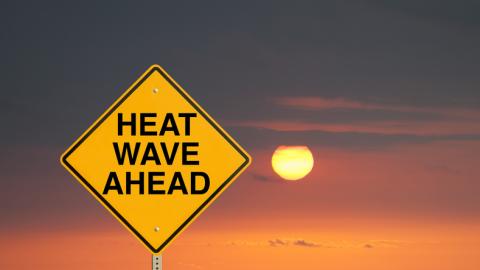Making an Emergency Preparation Plan? Don’t Forget Heat Waves!
Just about anywhere in the world, it’s getting hotter. Even Alaska recently experienced record-breaking hot temperatures, and while we don’t think of northern Europe as a torrid zone, England, Germany and France just experienced the hottest temperatures on record. Worldwide, public health experts are urging everyone to make a plan for days when the temperatures are dangerous.
These experts also warn that older adults are at highest risk of death during heatwaves, not only from heat-related illnesses such as heatstroke, but also due to an increase in heart attacks and respiratory problems.
Why is the risk greater for seniors? As we grow older, decreased blood circulation and a less efficient perspiration mechanism make it harder for our bodies to regulate temperature. Common health conditions such as cardiovascular disease, kidney or lung problems and an unhealthy body weight are also factors. Seniors are also more likely to take certain prescription medications that hinder the body’s ability to cool itself. And our thirst mechanism is less sensitive as we grow older, so it’s easier to become dehydrated.
Dr. Raquel Nunes of the University of Warwick in the UK has been researching the plight of seniors in a warming climate. She says that beyond the health reasons mentioned above, a number of social factors also put seniors at greater risk: elders may not realize the danger of high temperatures, their homes may not be designed for warmer temperatures; they may not know how to keep the interior cool, and they may be socially isolated. Dr. Nunes says that just as social agencies and neighbors, families and friends would look in on an elder during a hurricane or blizzard, they should also check up during heatwaves, and help seniors make a plan to be safe.
Here’s how family caregivers and friends can help senior loved ones be safe during periods of heat:
- If your loved one’s home has air conditioning, be sure it is in good working order. If it is an older model, check out newer, more efficient models.
- If your loved one is worried about energy costs, contact the local area agency on aging to find out about federal, state and local assistance programs.
- If the home is not air conditioned, help your loved one open windows during early morning and evening hours to let in cooler air. Close drapes to block the sun, and use fans to circulate air.
- If the home is still uncomfortably warm, help your loved one get to a place with air-conditioning—perhaps your own home or that of a friend, or to the mall or to a movie. Many communities offer daytime cooling centers, located in community centers, libraries, senior centers or schools. Locate a shelter ahead of time. If your loved one has a pet, find out if there are pet-friendly centers in the area.
- Encourage your loved one to drink plenty of fluids, even if they don’t seem thirsty. Fresh fruit also is a good source of fluids. Avoid caffeine and alcohol, which can increase dehydration. (People who are on a fluid-restricted diet should consult their physician before changing their fluid intake.)
- Encourage your loved one to dress in lightweight, light-colored, loose-fitting clothes. Natural fabrics, such as cotton and linen, are coolest. Many synthetic fabrics trap heat and perspiration against the body.
- Be aware of the signs of heat-related illness, such as dizziness, weakness, nausea and heavy perspiration. If ignored, these symptoms can progress to a dangerous condition called heatstroke. The symptoms of heatstroke are:
- Body temperature over 104°
- Confusion, staggering
- Dry, flushed skin with no sweating
- Strong, rapid pulse
- Headache
- Unconsciousness
Heat stroke is a medical emergency. Call 9-1-1 right away. While waiting for help to arrive, move the person to a cooler place. Remove or loosen tight clothing, and apply cool, wet cloths or towels to the skin.
